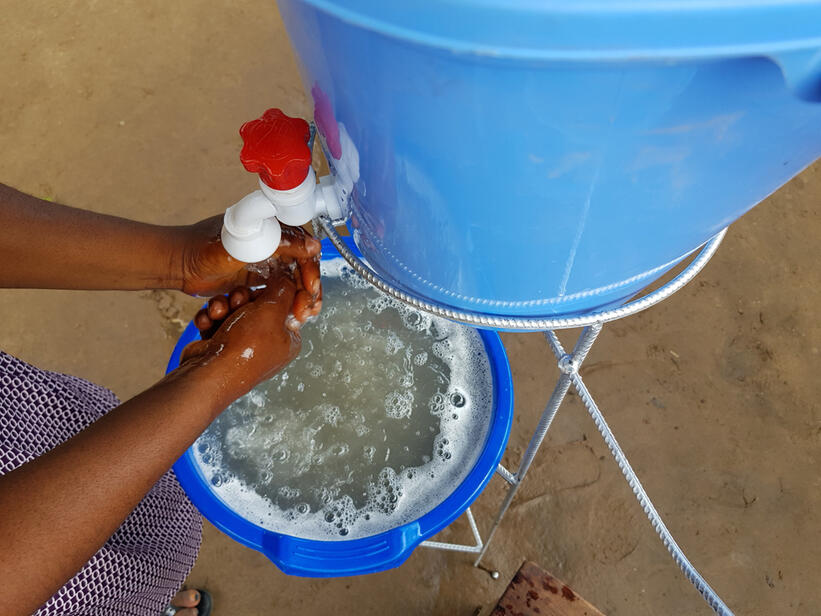
GLAAS data and the All Systems Connect International Symposium
Published on: 30/03/2023
Ahead of the All Systems Connect International Symposium 2023, Betsy Engebretson, Project Manager GLAAS, World Health Organization, outlines the importance of data in understanding, and advocating for systems leadership in water, sanitation and hygiene and its interconnected systems.

Data are key for understanding water, sanitation and hygiene (WASH) systems and taking informed actions to strengthen them. A major source of data on the strength of WASH systems is the UN-Water Global Analysis and Assessment of Sanitation and Drinking-Water (GLAAS), implemented by the World Health Organization (WHO). Since 2008, GLAAS data have shed light on WASH systems and the enabling environment.
The most recent GLAAS report – Strong Systems and Sound Investments: Evidence and Key Insights into Accelerating Progress on Sanitation, Drinking-Water and Hygiene – was released in December 2022 and features data from over 120 countries. The report calls for increased investment, stronger governance, financing, monitoring, regulation, and capacity development to scale up support for WASH service delivery.
The GLAAS 2022 report as well as GLAAS data since 2014 are available on the GLAAS data portal. Users can easily download GLAAS data (globally or from specific countries or regions) as well as do trend analysis and create different data visualizations. GLAAS data have never been more accessible or easy to analyse!
This urgent call for action and GLAAS data are particularly relevant to the IRC All Systems Connect participants, where WASH learning themes will be discussed in the context of delivering safely managed water and sanitation services, driving behaviour change, finding systemic solutions for water resource management, and promoting systems change through governments and politics. GLAAS data and analysis complement a number of the symposium’s themes.
WASH is critical for health. The GLAAS 2022 report features a section on WASH and health, highlighting data on hand hygiene, COVID-19 preparedness and response plans as well as WASH in health care facilities. While most countries address hand hygiene in WASH policies and plans, half of countries do not have national targets for hand hygiene.
Climate change will have, and is already having, a tremendous impact on safe WASH services. The GLAAS 2022 report looks at if countries are using climate change preparedness approaches in national planning and local level risk assessment as well as if there are measures to reach populations disproportionally affected by climate change. While governments are taking some action – 71% use climate change preparedness approaches for WASH in their national planning – a majority of countries do not address risks of climate change to WASH services or climate resilience of WASH technologies and management systems in their WASH policies and plans.
The GLAAS report highlights the need for safe and sustainably managed WASH services for all. The report shows that 45% of countries are on track to achieve their nationally defined drinking-water coverage targets, but only 25% of countries are on track to achieve their national sanitation targets. Better performing countries are more likely to have human and financial resources in place to implement WASH plans, regulatory authorities that carry out key regulatory functions and higher utilization of domestic capital commitments.
The GLAAS report emphasizes the need for governments to drive systems change in WASH services. The report shows that less than a third of countries reported having sufficient human resources required to carry out key WASH functions and a majority of countries reported insufficient funding for WASH.
The IRC All Systems Connect Symposium is an opportunity to call for governments to prioritize investment in WASH services and to promote policies that support the provision of sustainable and equitable WASH services. This includes promoting political leadership and advocacy for WASH services at all levels of government, as well as building capacity and promoting knowledge exchange to support the delivery of sustainable WASH services.
For both presenters and participants at the IRC All Systems Connect Symposium, as well as at forthcoming sector events, data from GLAAS can be used to understand WASH systems and take informed actions to strengthen them, complemented by the most recent data reported by the WHO/UNICEF Joint Monitoring Programme on WASH access and use. Connecting systems and working together is critical for achieving the Sustainable Development Goals and better health for all, and GLAAS data are foundational to that work.
----
At IRC we have strong opinions and we value honest and frank discussion, so you won't be surprised to hear that not all the opinions on this site represent our official policy.